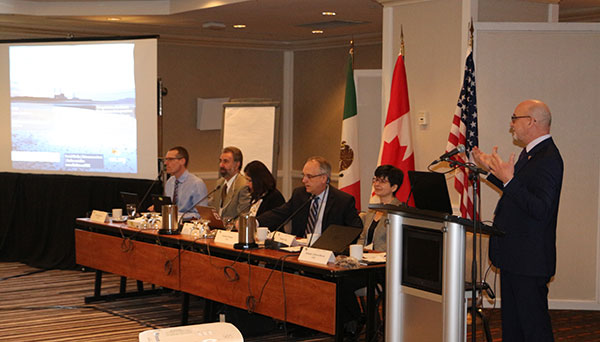Public meeting of the North American PRTR Initiative
Delta Hotel,
475 Avenue du Président-Kennedy,
Montreal, Québec
Canada
25 and 26 February, 2020
Public
This meeting, which is being organized this year in collaboration with Canada’s National Pollutant Release Inventory (NPRI) Data Users’ workshop, will bring together individuals from industry, governments, non-governmental organizations, academia, and the public interested in environmental sustainability within North American industry.
- Day 1 (delivered by the NPRI), will showcase the work of advanced NPRI data users, in order to understand their information needs and how these could be better met by the NPRI. Academics and researchers will present how they are using NPRI data and the linkages they are making to other data. Data users at all levels of proficiency are welcome.
- Day 2 (delivered by the CEC), will explore current and potential uses of North American PRTR data to better understand and address the needs of stakeholders across the region. Participants will have the opportunity to learn about program updates from representatives of the region’s three PRTRs; explore possible topics for analysis in the next Taking Stock report; learn about enhancements to the CEC’s Taking Stock Online website, data and tools; and provide suggestions for a North American industry pollution prevention “challenge” initiative.
Participation in the meeting is free of charge, but space is limited and all participants must register. Limited financial assistance for travel and lodging is available to eligible participants. The deadline for requesting financial assistance is 10 January 2020.

Agenda
25 February: NPRI Data Users Workshop
Objectives:
- To better understand advanced NPRI data users from academia, research and government, e.g.:
- What NPRI data are used by this audience?
- How are they obtained, how are they used?
- What other types of data are they linked to?
- To illustrate the versatility of the NPRI by showcasing the work of various data users
- To create a platform for users to network with each other and share best practices and lessons learned from using NPRI data
Registration
(15 mins)
1 – Welcoming remarks
Meeting objectives, overview of agenda, logistics, and a design-thinking brainstorm that will inform the design-thinking exercise later on.
Jody Rosenberger / Aline St-Laurent Guérin / Alicia Berthiaume (ECCC)
(15 mins +10)
2 – NPRI Public Opinion Survey
A brief summary of the results of the recent Public Opinion research survey conducted by NPRI and EKOS Research Associates

(15 mins +10)
3 – New NPRI Query site, Data products and Info products
An overview of recent changes made to the NPRI query site, data products (raw data) and information products (interpreted data e.g. fact sheets) to improve the NPRI user experience.

(15 mins +10)
4 – Journalists Perspective
Two journalists from Journal de Québec and Journal de Montréal will discuss their experiences in reporting on pollution using government pollution data.
Charles Lecavalier, Journal de Québec / Annabelle Blais, Journal de Montréal

Health Break (coffee/tea provided)
(25 mins +10)
5 – Exploring Co-Location of Adverse Birth Outcomes and Environmental Variables
A synopsis of four studies discussing: (1) the identification of industrial chemical emissions co-located with adverse birth outcomes across Canada; (2) the development of an ambient health hazard index for Alberta; (3) the formulation of hypotheses on the co-location of mixtures of industrial air pollution and adverse birth outcomes; and (4) the spatiotemporal modeling of hot spots.

(15 mins +10)
6 – Exposure to Industrial Air Pollutants Linked to Rheumatoid Arthritis Biomarker
An investigation of the association of anti-citrullinated antibodies (ACPA) with the ambient air pollutants fine particulate matter (PM2.5) and sulfur dioxide (SO2) in Québec.

(15 mins +10)
7 – Application of NPRI data in source apportionment, decadal trend analysis and atmospheric deposition studies of monitored air pollutants
A focus on source apportionment of atmospheric mercury, acidifying pollutant and polycyclic aromatic hydrocarbons in the Canadian oil sands region.

(30 mins)
8 – Design-thinking exercise
A paper exercise to extract data user needs using a design-thinking approach will be explained and then executed by participants.
Lunch (will be provided)
(15 mins +10)
9 – An overview of Canada’s National Pollutant Release Inventory program as a pollution control policy tool
This study investigates and critically discusses the stated policy goals of Canada’s NPRI to other Pollutant Release and Transfers Registers (PRTRs).

(15 mins +10)
10 – Integrating mass balance multi-media models to link NPRI data with chemical fate and exposure in the environment and the potential for adverse effects
A case study using the Risk Assessment IDentification And Ranking (RAIDAR) model to evaluate 252 NPRI organic chemicals for potential harmful effects to humans and the environment through hazard (“PBT”), exposure and risk assessment.

(15 mins +10)
11 – NPRI in accounting and modelling of water pollution impacts on the economy in the Great Lakes
A presentation on the creation of an integrated water basin accounting framework, linking economic activities to water as a source and a sink using the Great Lakes basin in Ontario as a case study.

(15 mins +10)
12 – What influences the pattern of pollutant releases?
An investigation of firms’ siting and household sorting decisions in Ontario

(15 mins+ 10)
13 – How TRI Data are Used by Academics and Other Researchers
An overview of US EPA programs and projects where US Toxics Release Inventory data are used to better understand pollution.

(40 mins)
14 – Panel discussion
Several presenters (Charlene Nielsen, Stuart J. Edwards, Roy Brouwer, Burc Kayahan, Charles Lecavalier) will serve as panelists to discuss various perspectives on using the NPRI.
Moderated by: Alicia Berthiaume (ECCC)
(10 mins)
Meeting wrap-up and closing remarks
Jody Rosenberger (ECCC)
26 February: Meeting of the North American PRTR Initiative
NPRI Data Users Workshop / Meeting of the North American PRTR Initiative
Registration
Session 1: Introduction and Goals of the Meeting – Orlando Cabrera-Rivera, CEC Head of Unit, Environmental Quality
Welcoming Remarks – Richard Morgan, CEC Executive Director
Session 2: North American PRTR Initiative: Update on Activities

Session 3: National PRTR Program Updates

United States’ Environmental Protection Agency Toxics Release Inventory
Download Presentation

Secretaría de Medio Ambiente y Recursos Naturales, Mexico Registro de Emisiones y Transferencia de Contaminantes
Download Presentation

Environment and Climate Change Canada National Pollutant Release Inventory
Download Presentation
Break
Session 4: Exploring Existing and Potential Uses of North American PRTR Data

University of California, Irvine Use of Mexico’s RETC Data to Evaluate Public Health Risk from Toxic Emissions
Download Presentation

Toronto Public Health Ten years of Toronto’s ChemTRAC program: Lessons learned
Download Presentation

Aamjiwnaang First Nation and Kristen Bos, Technoscience Research Unit, University of Toronto Pollution Reporter App
Lunch (provided)
Session 5: Addressing the Needs of North American PRTR Data Users: Discussion
As a follow-up to the preceding session, participants will be asked to share their experiences using PRTR data, and to provide suggestions for addressing identified issues.
Session 6: Suggestions for the Next Taking Stock Report: Discussion
Participants will be asked to provide input on possible analyses of interest for the next Taking Stock report.
Break
Session 7: Exploring Ideas for a North American Pollution Prevention Challenge (Panel) – Gary Vegh, ERA Environmental Management Solutions; Paola Hernandez, Grupo México; Sandra Gaona, U.S. EPA
Questions to be explored during this discussion:
- Are industry sustainability efforts reflected in PRTR reporting?
- What are the barriers to implementing pollution prevention/sustainable production practices?
- What are some feasible approaches for a North American voluntary industry pollution prevention initiative?
Session 8: Next Steps and Closing Remarks – Orlando Cabrera-Rivera, CEC